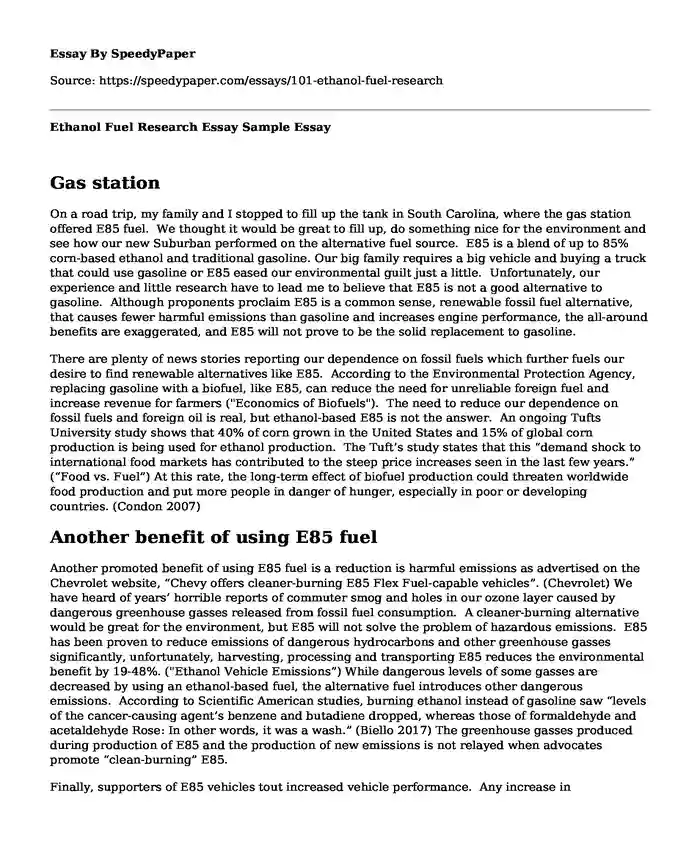Gas station
On a road trip, my family and I stopped to fill up the tank in South Carolina, where the gas station offered E85 fuel. We thought it would be great to fill up, do something nice for the environment and see how our new Suburban performed on the alternative fuel source. E85 is a blend of up to 85% corn-based ethanol and traditional gasoline. Our big family requires a big vehicle and buying a truck that could use gasoline or E85 eased our environmental guilt just a little. Unfortunately, our experience and little research have to lead me to believe that E85 is not a good alternative to gasoline. Although proponents proclaim E85 is a common sense, renewable fossil fuel alternative, that causes fewer harmful emissions than gasoline and increases engine performance, the all-around benefits are exaggerated, and E85 will not prove to be the solid replacement to gasoline.
There are plenty of news stories reporting our dependence on fossil fuels which further fuels our desire to find renewable alternatives like E85. According to the Environmental Protection Agency, replacing gasoline with a biofuel, like E85, can reduce the need for unreliable foreign fuel and increase revenue for farmers ("Economics of Biofuels"). The need to reduce our dependence on fossil fuels and foreign oil is real, but ethanol-based E85 is not the answer. An ongoing Tufts University study shows that 40% of corn grown in the United States and 15% of global corn production is being used for ethanol production. The Tuft’s study states that this “demand shock to international food markets has contributed to the steep price increases seen in the last few years.” (“Food vs. Fuel”) At this rate, the long-term effect of biofuel production could threaten worldwide food production and put more people in danger of hunger, especially in poor or developing countries. (Condon 2007)
Another benefit of using E85 fuel
Another promoted benefit of using E85 fuel is a reduction is harmful emissions as advertised on the Chevrolet website, “Chevy offers cleaner-burning E85 Flex Fuel-capable vehicles”. (Chevrolet) We have heard of years’ horrible reports of commuter smog and holes in our ozone layer caused by dangerous greenhouse gasses released from fossil fuel consumption. A cleaner-burning alternative would be great for the environment, but E85 will not solve the problem of hazardous emissions. E85 has been proven to reduce emissions of dangerous hydrocarbons and other greenhouse gasses significantly, unfortunately, harvesting, processing and transporting E85 reduces the environmental benefit by 19-48%. ("Ethanol Vehicle Emissions”) While dangerous levels of some gasses are decreased by using an ethanol-based fuel, the alternative fuel introduces other dangerous emissions. According to Scientific American studies, burning ethanol instead of gasoline saw “levels of the cancer-causing agent’s benzene and butadiene dropped, whereas those of formaldehyde and acetaldehyde Rose: In other words, it was a wash.” (Biello 2017) The greenhouse gasses produced during production of E85 and the production of new emissions is not relayed when advocates promote “clean-burning” E85.
Finally, supporters of E85 vehicles tout increased vehicle performance. Any increase in performance will not solidify E85 as a consumer replacement for fossil fuel consumption. Chevrolet advertises “higher horsepower and torque levels” because E85 has a higher-octane rating. (Chevrolet 2017) I can attest that our truck did have a little more pickup, especially when passing on the interstate, but it was the noticeable reduction in fuel mileage that was most evident. Consumer Reports performed their road test in 2011 and found a decrease from 21 to 15 mpg on the highway. ("Ethanol (E85) Fuel Alternative”) The higher octane means that the ethanol will burn hotter and faster resulting in a tradeoff between acceleration and fuel mileage.
Ultimately, many consumers, like myself, want to feel better about our environmental footprint. I would love to be a part of the generation that solves the problems associated with world reliance on fossil fuel consumption. Apparently, research is taking place; scientists are brainstorming and implementing possible renewable alternatives. The fact that vehicles capable of using E85 are marketed and sold today is a testament to years of research. Unfortunately, this fuel source is not living up to the advertising. The ethical questions of using a world food product as fuel, the trade-off emission findings and costs associated with increased performance do little to ease consumer guilt about environmental footprints. Hopefully, the research will continue, and scientists will continue to seek out alternative fuels, and E85 will have been a step along the path to freedom from fossil fuels.
Works Cited
Biello, David. "Want to Reduce Air Pollution? Don't Rely on Ethanol Necessarily." Scientific American. Scientific American, A Division of Nature America, INC., 18 Apr. 2007. Web. 21 Mar. 2017.
Chevrolet. Chevrolet.com. N.p., n.d. Web. 16 Mar. 2017.
Condon, Nicole, Heather Klemick, and Ann Wolverton. "Working Paper: Impacts of Ethanol Policy on Corn Prices: A Review and Meta-Analysis of Recent Evidence." EPA. Environmental Protection Agency, 06 Feb. 2017. Web. 23 Mar. 2017.
"Economics of Biofuels." EPA. Environmental Protection Agency, 27 May 2016. Web. 19 Mar. 2017.
"Ethanol (E85) Fuel Alternative - Consumer Reports." Ethanol (E85) Fuel Alternative - Consumer Reports. Consumer Reports, Jan. 2011. Web. 19 Mar. 2017.
"Ethanol Vehicle Emissions." Alternative Fuels Data Center: Ethanol Vehicle Emissions. U.S. Department of Energy, 16 Mar. 2017. Web. 23 Mar. 2017.
"Food vs. Fuel." Tufts.edu. Tufts University Global Development and Environment Institute, n.d. Web. 18 Mar. 2017.
Cite this page
Ethanol Fuel Research Essay Sample. (2018, Dec 18). Retrieved from https://speedypaper.com/essays/101-ethanol-fuel-research
Request Removal
If you are the original author of this essay and no longer wish to have it published on the SpeedyPaper website, please click below to request its removal:
- Free Essay on Chinese Philosophy
- Essay Sample on Smoke-Auggie Wren's Christmas Story
- Financial Ratios Essay Example
- Defining Global Education
- Essay Sample on Waste Profiling through Laboratory Analysis
- Essay Sample on Starbucks' Human Resource Management Practices
- Free Essay: Racism Towards Women in the Workplace
Popular categories





